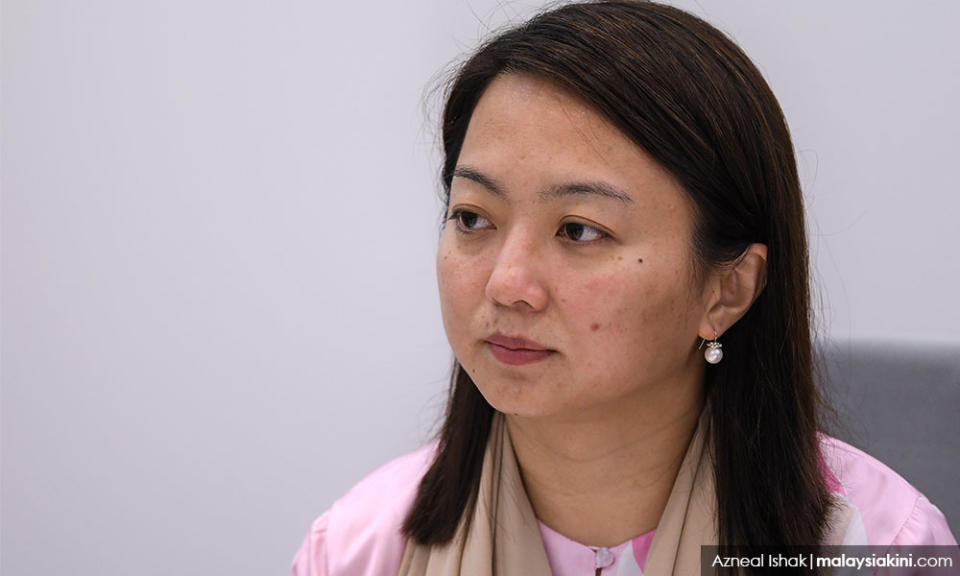'Lobby to end gender inequality in citizenship process must continue, adapt'

Targeted and intensified lobbying must continue towards passing a constitutional amendment needed to secure equal rights for Malaysian men and women to confer nationality on their spouses and children, according to children's rights advocates.
Panellists at a forum analysing strategies to address challenges faced by transnational families during Covid-19 today noted that their ongoing problems have intensified under border closures and travel restrictions.
Segambut MP Hannah Yeoh said the previous Pakatan Harapan administration had made some progress towards resolving the matter but the main barrier remains to be a conservative approach adopted by administrative gatekeepers within Putrajaya.
"Despite having the (former) deputy prime minister (Dr Wan Azizah Wan Ismail) as the women, family and community development minister, we were not able to get this changed, simply because of the gatekeepers.
"The home minister will turn to his gatekeepers and ask them, 'What should we do?' and they will say, 'This cannot be done' and 'This is too difficult', so they don't try," said the former women, family and community development deputy minister.
"That's why I said we need to find a new way to lobby, especially the home minister, because currently too much discretionary powers are placed in one man's hands," she added.
Yeoh shared that Wan Azizah's engagements at the time only resulted in a promise by Prime Minister Muhyiddin Yassin, as then home minister, to expedite the process for Malaysian mothers seeking to register their child as a citizen.

However, she said the promise was only announced for new citizenship applications while there remains over 40,000 backlogged unresolved matters pending with the Immigration Department.
For couples staying abroad during the current Covid-19 pandemic, Yeoh noted that there could be cases of Malaysian women caught in unhappy marriages but they were left with no means to escape due to uncertainties over their children's citizenship status.
By giving birth overseas, a Malaysian woman with a foreign spouse will be unable to confer Malaysian citizenship on her newborn.
The Federal Constitution only guarantees citizenship to children born overseas to Malaysian fathers but is silent on children born overseas to Malaysian mothers.
Yeoh stated that she would continue to raise the matter in Parliament during upcoming debates for the Home Ministry's budget, on top of urging civil society stakeholders to make themselves heard by the government.
Senior consultant paediatrician Dr Amar Singh, however, said a negative perception towards foreigners in Malaysia could render untenable efforts to rally public pressure on the needed policy changes.
On top of ongoing advocacy efforts by various local groups, he noted that there could also be a need to consider targeted lobbying of well-connected individuals.
"I am sorry, unfortunately, I have this habit of being too honest. The real jalan (way) is for you to whisper in somebody's ear, (if) you got the cable and that person said 'okay lah I will do it'.
"If you know somebody and the person likes you and you're friends, you can get quite a lot done in the civil service to change policies, sadly," he said.
"Perhaps we should look at who is the immigration director's friend and lobby with that individual, whisper into his ears, maybe that would be a better approach," he added.

Overall, Amar said the current state of enforced separation affecting transnational families could lead to various problems in a child.
"For those (children) who are separated (from a parent), their pain and anguish are intensified... Children feel less hopeful for their future and this hopelessness is not good to be instilled in a child's heart.
"I don't think online communication of any sort can replace the physical presence of a parent to a child," he added.
In the long-term, Amar said a child could suffer from separation anxiety disorder and develop symptoms of depression, with increased risk of substance abuse in their adult years.
"Basically what you are crafting into a very young child's being is an insecure dependent personality... Separating children from one family member is not a good idea and will have long-term impacts," he explained.
For non-citizen children with a Malaysian parent residing here, panellists at the virtual dialogue hosted by the Foreign Spouses Support Group (FSSG) also noted unresolved issues including denial of equal access to state healthcare and education.
Other panellists at the dialogue, which was organised on World Children's Day, included FSSG co-founder Bima Ramanand and Suhakam Children's Commissioner Noor Aziah Mohd Awal.


